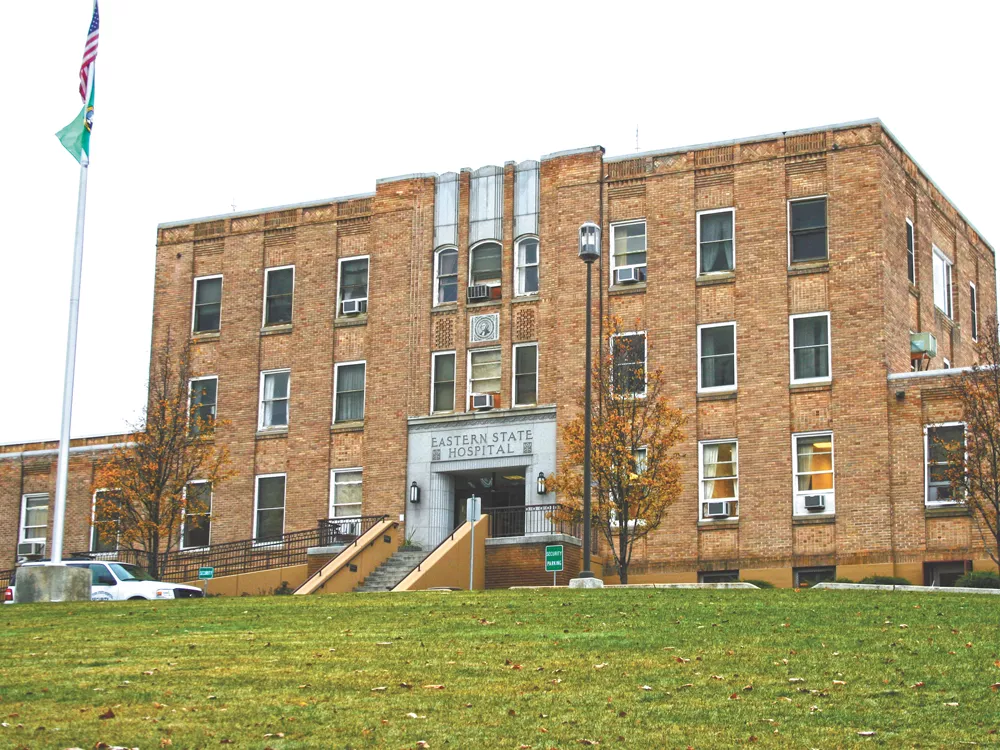A violent murder at the Eastern State Hospital has renewed union concerns that the dwindling number of hospital employees may face increasingly unsafe working conditions.
Tim Welch, a spokesman for the Washington Federation of State Employees representing the workers, says hospital staff levels have not kept pace with the number of patients in recent years. Employees have repeatedly voiced fears that staff cuts undermine safety at the mental health facility in Medical Lake.
“There is a concern that there aren’t enough staff on the ward,” he says. “For hospital employees and patients, there is a greater chance of injury, or worse.”
On Nov. 20, Spokane deputies arrested 30-year-old ward patient Amber Roberts on suspicion of first-degree murder after another patient, Duane Charley, 56, was found strangled in his room. Court records state Roberts claimed responsibility for the killing, but she has pleaded not guilty in a preliminary court appearance.
Welch says no one yet knows whether reduced staffing played any part in the tragedy, but he believes the incident exposes some of the high stakes and potentially dangerous situations hospital workers face every day.
“It’s a part of a larger issue that’s gone on there for years,” he says.
An annual workplace safety report, released in September, shows Eastern State Hospital employees suffered 224 assaults from patients in 2011. They reported 238 assaults the year before. Many minor assaults also go unreported.
The report states staff recently received “flexible pens” to reduce the possibility of them being used as weapons. But it notes budget cuts have also reduced the number of security guards on duty.
“There is currently one security guard on duty for both the afternoon and night shift due to lack of funding for additional positions,” the report states. “This reduces security’s ability to respond to emergencies and unauthorized leaves, monitor the campus for trespassing, unsecured doors, etc.”
The Department of Social and Health Services, which operates the state mental hospitals, reports annual funding for Eastern State Hospital has fallen from $59.4 million in 2008 to $54.5 million set for next year, part of statewide budget cuts.
The hospital has also lost 64 full-time employees since 2008, with staff dropping from 742 to 678 workers this year. Another 14 employees have been cut from next year’s budget.
John Wiley, a DSHS spokesman in Spokane, says safety and staffing levels remain constant concerns for the department. He acknowledges budget cuts have forced layoffs, but notes federal hospital certification agencies have not found any staffing deficiencies.
“We’re always talking about safety,” he says. “That’s an ongoing discussion.”
Wiley says the department has worked to balance staffing and budget issues. One ward was closed as part of the staff cuts, and administrators have tried to avoid cutting employees who work most directly with patients.
An administrative review is scheduled, he says, to investigate what circumstances may have factored into the recent patient’s death.
Just a few hours after the patient’s body was found at Eastern State Hospital, the state’s legislative Select Committee on Pension Policy held a previously scheduled hearing in Olympia on the risks of working in one of the state’s mental health hospitals.
Frederick Brown, a psychiatric security attendant at Western State Hospital in Lakewood, told the committee about a number of assaults he had witnessed over the years. He said a patient hit him with a sock full of batteries in October.
“He hit me in the back,” Brown said, “but make no mistake he was aiming for my head.”
One committee member, state Sen. Mark Schoesler, R-Ritzville, asked Brown if hospital employees working out on the wards have sufficient safety equipment and training.
“No,” he answered, adding, “In my opinion, you can’t give us enough equipment. ... It’s the nature of the job. There’s always going to be risk.”

